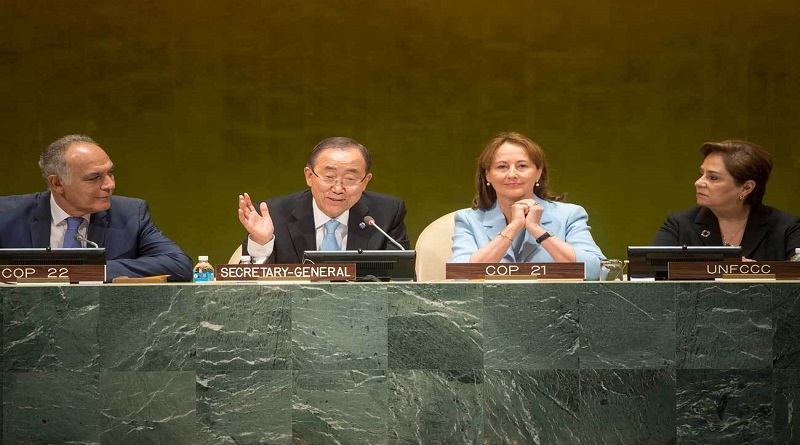Worldwide green light for climate action as Paris Agreement enters into force
A big green light for faster, stronger climate action was switched on today as the Paris Climate Change Agreement entered into force, only three days before the start of this year’s UN Climate Change Conference in Marrakech.
“The Paris Agreement’s ambitious and essential goals are now a live reality for every government. From today, ever-increasing climate action becomes an accepted responsibility and a central part of the sustainable development plans of all countries,†said Patricia Espinosa, Executive Secretary of the UN Framework Convention on Climate Change (UNFCCC).
The international effort to bring the Paris Agreement into force in less than a year – an unexpectedly rapid result – reflects the strong, common political will to shift as quickly as possible towards the low-carbon, resilient economies and societies which are the only way to avoid the worst impacts of climate change.
“Climate action – faster, smarter, bigger and better – reduces the greenhouse gas emissions which drive climate change and at the same time catalyzes the clean power economies and climate-resilient societies which are the foundation on which the future health, wealth and well-being of all people now depend,†said Ms. Espinosa.
Last year, countries of the world constructed a fresh, integrated vision for the future which rests firmly on the Paris Agreement, the 2030 Agenda for Sustainable Development and the Sendai Framework for Disaster Risk Reduction.
These momentous agreements must succeed together and require unprecedented scale and depth of universal and concerted action involving all governments, local and regional authorities, business and investment actors at all levels and in all countries.
Pressing Timetable and Key Tasks for Marrakech Conference
The timetable is pressing. The Paris Agreement’s primary goal – to limit global warming to well below 2°C and as close to 1.5°C as possible to prevent dangerous tipping points in the climate system – means that global emissions must peak soon then be driven down very rapidly.
Yet greenhouse gas concentrations in the atmosphere and global average temperatures continue rising, underlining the urgent task in front of the two-week COP 22 conference in Marrakech, beginning Monday, 7 November.
The Agreement’s early entry into force has focused minds on completing the fundamental work and confirming the key requirements that will allow countries together to implement Paris’s goals at the required scale and speed. In Marrakech, that includes several important issues.
Marrakech will host the first meeting of the Paris Agreement’s governing body, known as the CMA. This is a moment of celebration but also a moment of reflection on the task ahead and a point where governments recommit to the new agenda of rapid implementation, not least in pressing forward with adequate support for vulnerable countries to take their own action.
Meanwhile, work will continue in Marrakech to complete the details of a transparent global regime, or rulebook, which will account for, review and underpin greater action by all sides.
It is the completed rulebook that will make the Paris Agreement work smoothly over the years and decades to come. The early entry into force of the Agreement calls for a speedy completion of the rulebook, ideally by 2018.
Marrakech also gives developed countries the opportunity to present their roadmap to mobilize the pledged 100 billion dollars in annual support to developing countries by 2020.
The Standing Committee on Finance will present its Biennial Assessment report, which provides a picture of climate finance flows for the period 2013-2014. It will do so at a side event on Monday, 7 November.
Governments will also be looking to increase clarity for adaptation finance and for a mechanism to strengthen capacity building, which supports developing countries to build up their internal skills and institutional strengths to build their own clean energy, sustainable futures.
Climate-friendly national policies are central to the successful delivery of the Paris goals. This is especially so because the Agreement’s success rests on full implementation of the global set of national climate action plans.
COP 22 will see initiatives that support the implementation of these so-called Nationally Determined Contributions (NDCs) and help integrate them into each country’s development agenda alongside the Sustainable Development Goals.
The NDCs coupled with governments’ publicly accepted responsibility to lead climate action under the Agreement, place an emphasis on how countries integrate climate action and implement sustainable development and risk management goals across sectors and ministries.
One initiative to support countries in this is the NDC Partnership. Launching on Tuesday, 15 November, the NDC Partnership is a coalition of developing and developed countries and international institutions working together to ensure countries receive the technical and financial support they need to achieve climate and sustainable development goals as fast and effectively as possible.
Policy, incentives and regulation should all work in a concerted, coherent manner to enable every country to deliver their climate and sustainability contributions and, crucially, to increase exponentially the climate action by cities, states, companies, investors and citizens.
For this reason, Marrakech will provide a Global Climate Action forum over the two weeks to showcase and hear new initiatives from the many public and private partnerships that are driving global climate action to unprecedented levels.




